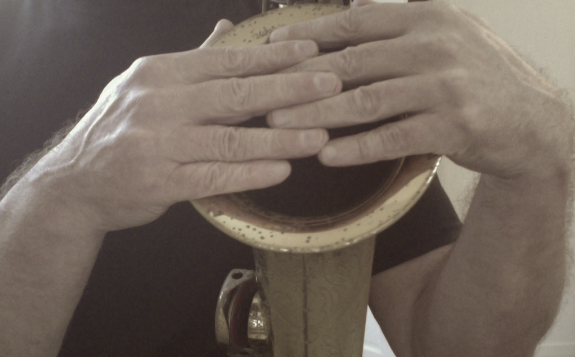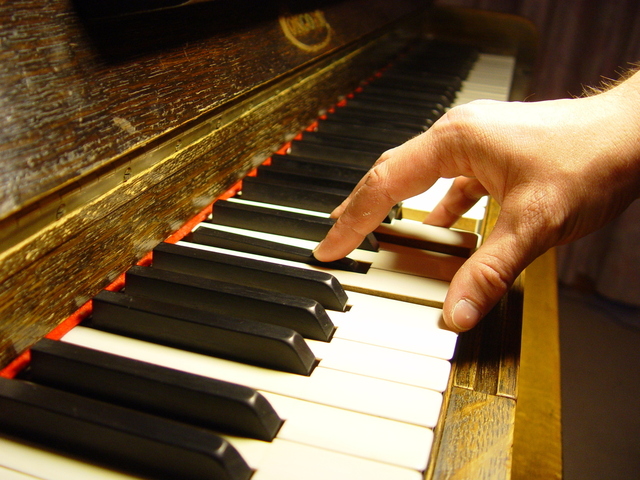What is it that makes a particular jazz artist sound so immediately recognizable?
Is it tone? Phrasing? Rhythmic conception? Time feel? Articulation? Harmonic vocabulary? Melodic sensibility? Something else entirely….? Perhaps even something undefinable?
Truth be told, it’s probably not one single thing.
Though there certainly are distinctive qualities some artists possess that immediately stand out to the listener (John Coltrane’s sound on tenor saxophone is a good example), in reality, it is a seamless integration of various musical and artistic qualities that make an artist sound so unmistakably like him/herself.
I call this easily identifiable quality the “voice” of the improviser.
Just like you have a singularly unique voice when speaking, so too, can you have one when improvising. It’s a matter of making a commitment to finding who you are (what you want to say!) through improvisation.
The beautiful thing about studying improvisation is that you can endlessly explore, discover and cultivate your voice through genuine curiosity and disciplined work. Defining your improvisational voice can be a highly satisfying life long endeavor.
Defining your voice has two components:
- Becoming more aware of what’s already there; i.e., how you’re already playing.
- Aiming for how you’d like to play. (Understand that this will be in a constant state of change.)
Let’s start with what’s already there. How aware are you of your current voice? How well do you actually hear yourself as you improvise? If you listen to yourself whenever you record, are you rather surprised by what you hear? (for better or for worse…)
If the gap between how you imagine you sound, and how you actually sound whenever you hear yourself on recordings is significant, you might want to bridge that gap.
Start recording yourself fairly regularly (easy and inexpensive to do these days with smart phone and tablet technology). Then listen carefully, as objectively as possible, to what you hear. In this case, I’m not talking about hearing flaws or weaknesses in your musicianship (like pitch and time, for example).
Rather, I’m talking about some of the things I mentioned above: your sound, your articulation, your phrasing and use of space, your use of dynamics, your voice-leading sensibilities (or lack thereof), your time feel, your rhythmic language, harmonic choices, etc.
Become intimately familiar with what you like, and what you don’t like about your voice as it currently is (but be kind to yourself about the “don’t like” stuff). Become a stickler for details. Listen as if you were listening to somebody else. Really take in your playing completely.
When you’re clear about what you do like, keep that dear to your heart as the foundation of the voice you wish to develop.
Which brings us to aiming for how you’d like your voice to be. This could come from an internal source (your own imagination), an external source (your favorite players), or a combination of both. It really is a question of what you like, of what you want to express…of who you are.
If you want to sound just like your favorite artist, so be it. Go after it with all your heart. Listen and transcribe, emulate, play along, etc. Lose yourself (in the best sense of the word!) in the world of this particular artist. Let that emerge through you.
On the other hand, if you wish to find your own voice, start by becoming intimately familiar with what’s already in your imagination.
A great way to do this is by singing improvisations along with a backing track or other accompaniment. Record and transcribe yourself. Play your transcription on your instrument. Analyze what you hear. Again, keep what you like. It’s truly yours.
As you get clearer and clearer about how you’d like to cultivate your own voice, you’ll continue to more readily know when you’re moving in the right direction. You’ll even get a sense of when you’re really embodying the voice you seek, when what you’re feeling/hearing and you’re playing are inseparably linked.
Make that embodiment the standard you aspire to as you study and practice.
When I practice improvisation, I’m always aiming for my voice, for how I want to sound. This may seem obvious, but it is easy for a skilled improviser to fall into what I call the “task” of improvising (flowing along in time, “making the changes”, sounding “cogent”, etc.)
While that might be fine for some musicians to get by on a gig, it is not satisfying to me as an artist. My love for, and my commitment to, improvisation is about going ever deeper into how my voice unfolds and reveals itself to me.
It is for this reason that I do these four things every day that I practice:
1. Sing-I sing with and without a backing track to hear how I’m hearing (yes, I meant to say that). I often record, sometimes transcribe, and typically become edified and guided by what I sing.
2. Improvise slowly-This is the bulk of what I do. I improvise over tunes, modes, or melodic themes at very slow tempos (quarter note equals 40-60), listening carefully to what I’m playing, but not trying to force my playing to go anywhere. My aim in doing this is to get in touch with my voice. As I begin to increase tempo, I never go faster than my ability to maintain my desired voice allows. No auto pilot, no muscle memory, no patterns.
3. Rhythmic study-For me, so much of my voice depends on my flexibility with time and rhythm. As I work on specific skills (like polymeter and polyrhythm), my voice gets clearer, as well as closer to what I wish to express.
4. Free improvisation-I work with drones, thematic fragments, drum loops, a “general feeling”, time or no time, but no bar forms or no chord changes…all kinds of different ways to help me find the immediacy of that which I’d like to express. This kind of work not only further defines and clarifies my voice, but it also helps me to play with greater freedom and confidence over chord changes.
Keep in mind that when I speak of my voice this way, I’m speaking of a never-ending discovery and evolution. As I grow, so grows my voice. It is dynamic, not static.
So what is your voice? How would you like to play? What do you imagine for yourself? Are you already satisfied? Or do you want more?
I’ll leave you with a wonderful recording by pianist Lennie Tristano playing over his composition, Line Up (based on the chord changes to All of Me ). This is a beautiful example of somebody who was deeply and endlessly committed to finding and expressing his voice. It’s hard for me to believe this was recorded in 1954, as it is still very “modern” sounding, even by today’s standards. (Notice in particular his extraordinary use of rhythm and phrasing in relationship to the form.) Hope you enjoy!

